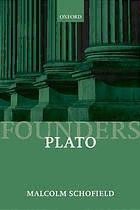
Plato: Political Philosophy PDF
Preview Plato: Political Philosophy
Founders of Modern Political and Social Thought PLATO FOUNDERS OF MODERN POLITICAL AND SOCIAL THOUGHT SERIES EDITOR Mark Philp OrielCollege,UniversityofOxford TheFoundersseriespresentscriticalexaminationsoftheworkofmajorpolitical philosophers and social theorists, assessingboth their initial contribution and theircontinuingrelevancetopoliticsandsociety.Eachvolumeprovidesaclear, accessible, historically informed account of a thinker’s work, focusing on a reassessmentofthecentralideasandarguments.Theseriesencouragesscholars and students to link their study of classictexts to current debates in political philosophyandsocialtheory. Alsoavailable: johnfinnis:Aquinas richardkraut:Aristotle gianfrancopoggi:Durkheim maurizioviroli:Machiavelli cherylwelch:DeTocqueville PLATO Political Philosophy Malcolm Schofield 1 1 GreatClarendonStreet,Oxfordox26dp OxfordUniversityPressisadepartmentoftheUniversityofOxford. ItfurtherstheUniversity’sobjectiveofexcellenceinresearch,scholarship, andeducationbypublishingworldwidein Oxford NewYork Auckland CapeTown DaresSalaam HongKong Karachi KualaLumpur Madrid Melbourne MexicoCity Nairobi NewDelhi Shanghai Taipei Toronto Withofficesin Argentina Austria Brazil Chile CzechRepublic France Greece Guatemala Hungary Italy Japan Poland Portugal Singapore SouthKorea Switzerland Thailand Turkey Ukraine Vietnam OxfordisaregisteredtrademarkofOxfordUniversityPress intheUKandincertainothercountries PublishedintheUnitedStates byOxfordUniversityPressInc.,NewYork ©MalcolmSchofield2006 Themoralrightsoftheauthorhavebeenasserted DatabaserightOxfordUniversityPress(maker) Firstpublished2006 Allrightsreserved.Nopartofthispublicationmaybereproduced, storedinaretrievalsystem,ortransmitted,inanyformorbyanymeans, withoutthepriorpermissioninwritingofOxfordUniversityPress, orasexpresslypermittedbylaw,orundertermsagreedwiththeappropriate reprographicsrightsorganization.Enquiriesconcerningreproduction outsidethescopeoftheaboveshouldbesenttotheRightsDepartment, OxfordUniversityPress,attheaddressabove Youmustnotcirculatethisbookinanyotherbindingorcover andyoumustimposethissameconditiononanyacquirer BritishLibraryCataloguinginPublicationData Dataavailable LibraryofCongressCataloginginPublicationData Schofield,Malcolm. Plato:politicalphilosophy/MalcolmSchofield. p.cm. —(Foundersofmodernpoliticalandsocialthought) Includesbibliographicalreferencesandindex. ISBN-13:978–0–19–924946–6(alk.paper) ISBN-10:0–19–924946–6(alk.paper) ISBN-13:978–0–19–924961–9(alk.paper) ISBN-10:0–19–924961–X(alk.paper) 1. Plato—Politicalandsocialviews. I. Title. II. Series. JC71.P62S362006 321(cid:1).07—dc22 2006016279 TypesetbyLaserwordsPrivateLimited,Chennai,India PrintedinGreatBritain onacid-freepaperby BiddlesLtd.,King’sLynn,Norfolk ISBN0–19–924961–X 978–0–19–924961–9 ISBN0–19–924946–6(Pbk.) 978–0–19–924946–6(Pbk.) 1 3 5 7 9 10 8 6 4 2 ForMatthew This page intentionally left blank Preface This book had its origin (I believe) in a suggestion from Myles BurnyeattoMarkPhilp,generaleditoroftheFoundersofModern Political and Social Thought series. Serious thinking began in response to an invitation to deliver Carlyle Seminars on the Republic in Oxford in Trinity Term 2000. The philosophers, historiansandpoliticaltheoristswhoparticipatedgavemyideas a warm and argumentative reception. Through the good offices of Myles Burnyeat I was privileged to enjoy the hospitality of the Warden and Fellows of All Souls during my visits. Serious writing was made possible by a year’s sabbatical in 2003–04. I thankmy colleagues in the Faculty of Classics at Cambridgefor shoulderingburdensinmyabsence.AnotherleaveinLentTerm 2005 and the honour and stimulus of the John and Penelope Biggs Residency at Washington University, St Louis, set me up for the final push. I am most grateful for the challenging week I enjoyed in St Louis as a guest of the university and its classics department. I was showered with generous hospitality: I hope it will not be too invidious if I thank Bob Lamberton and Eric Brownaboveallfortheirmanykindnesses. I have profited from the observations and criticisms of col- leagues on numerous occasions, both when I have delivered versions of particular chapters as talks in various parts of the world and in innumerable private conversations. A whistle-stop lecture tour in March 2004, taking in Northwestern, Brown and Princeton Universities and the University of Toronto, was particularly helpful; and I returned with a draft of Chapter 5 from an unforgettable stay in May of that year at the Fonda- tion Hardt—itself a sort of utopia. A number of friends gave me extensivewrittencommentsonthefirstdraftofthewholebook: Christopher Gill, Melissa Lane, Geoffrey Lloyd, David Sedley and Christopher Taylor. It is much the better for their varied input, both in detail and in its broader horizons. Two anonym- ous readers for the Press wrote encouragingly about the draft and the project as a whole, and were again very helpful in high- lighting things to work on further. Finally, Mark Philp for the series and Peter Momtchiloff for the Press have been the most PREFACE relaxed and kindlyofeditors. WhenMark finally got afulldraft, he sent me one of the most searching and beautifully nuanced set of responses I’ve ever had to anything I’ve written, at once supportive and delicately quizzical. My thanks also go to Jenni Craig,HelenGray,andAndrewHawkeyintheeditorialteamfor theirfriendlyefficiency. The book attempts both to ground an analytic account of Plato’s political philosophy in its historical context, and to suggestsomeoftheresonancesitfindsormightfindinmorecon- temporary concerns and more recent political thought. I don’t suppose I could have conceived that ambition or worked out a strategy for carrying it through without the different sorts of examples set by three scholars in particular: Moses Fin- ley, Quentin Skinner and Josh Ober—whose advantages over me include being proper historians. Learning to read Plato is a continuing adventure. I am particularly indebted to colleagues in Cambridge, who have frequently returned to Plato in our Thursdayeveningreadinggroup,andabovealltoMylesBurnyeat, for all we have learned from him, especially during his time as LaurenceProfessorofAncientPhilosophy. In the years through which this book was in the making I had as always the unassuming loving support of my wife Elizabeth. She died at the end of July 2005, trying to complete the massive, hugely demanding, and often lonely archaeological writing project on which she had been working for a decade and ahalf. viii Contents Introduction 1 1. The Republic:Contextsand Projects 7 1. TheCentrepiece 7 2. SomeDubiousPlatonicAutobiography 13 3. Socrates:EngagementandDetachment 19 4. TheProjectsoftheRepublic 30 5. Education,SpartaandthePoliteiaTradition 35 2. Athens, Democracy and Freedom 51 1. DemocraticEntanglements 51 2. DemocracyandRhetoric 63 3. TheLawsonDemocracyandFreedom 74 4. Conclusion 88 3. Problematizing Democracy 100 1. FromPolaritytoComplexity 100 2. Democracy,EqualityandFreedom 107 3. DemocracyandPluralism 112 4. DemocracyandAnarchy 117 5. DemocracyandKnowledge 121 6. Conclusion 130 4. The Ruleof Knowledge 136 1. PhilosophyorPoliticalExpertise? 136 2. MillandJowettonPlato 138 3. ArchitectonicKnowledge 144 4. PhilosopherRulers 155 5. ArchitectonicKnowledgeRevisited 164 6. TheLimitationsofManagement 173 7. Conclusion 182 5. Utopia 194 1. AgainstUtopia 194 2. AQuestionofSeriousness 197 3. AFutureforUtopianism 199 4. Plato’sUtopianRealism 203
